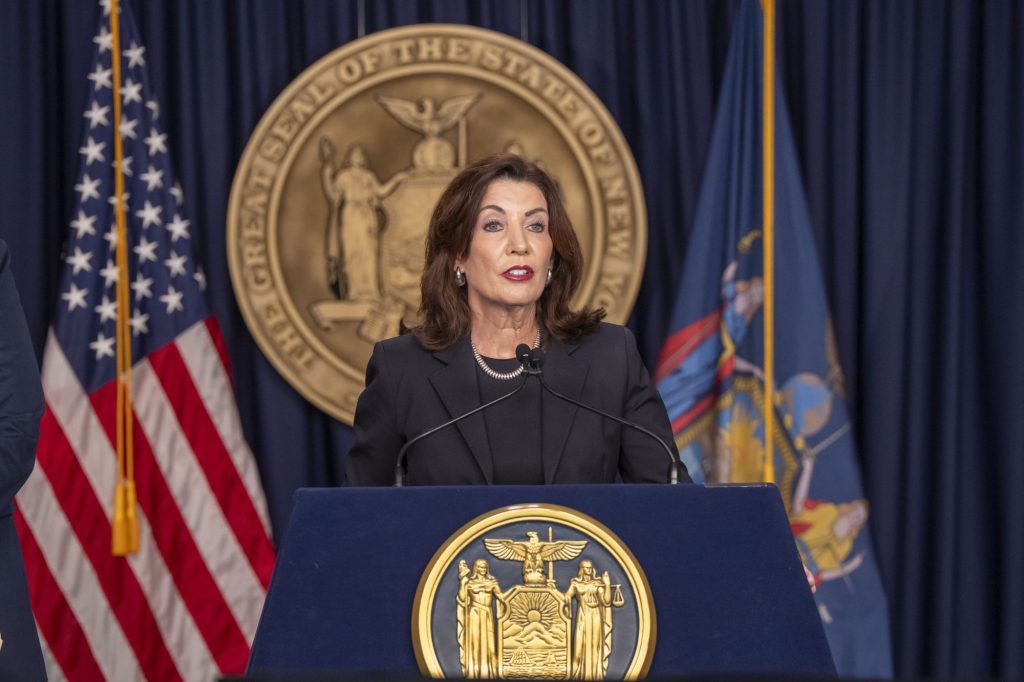Hochul, Adams offer Trump a bogus olive branch — seeking not peace, just cash
Democrats lost last week’s election, bigly — but New York Democrats were even more soundly defeated: Everything that Gov. Hochul and Attorney General Letitia James tried to throw at Donald Trump failed to stick.
The good news for Gotham is that the governor seems to have learned a little humility, and is pledging to cooperate with President-elect Trump. Mayor Adams wisely never made an enemy of Trump in the first place.
The bad news is that Hochul’s and Adams’ idea of cooperation is to take lots of federal cash, courtesy of the nation’s taxpayers — when what New Yorkers voted for was not dollars but change.

It’s easy to see last week’s conciliatory remarks from Hochul, in particular, as a refreshing shift in tone.
On Thursday, the governor — after standing with AG James and threatening the president with more “I will fight you” lawfare the day after the election — belatedly realized she’s got to work with this guy, and called Trump to offer congratulations and find common ground on transit funding.
Adams set a similar tone, congratulating Trump Wednesday and pledging to work with him on “housing, infrastructure, education, health care and more.”
And Adams was never virulently anti-Trump, anyway: He spent the last weekend before the election defending the former president from the (now-failed) “fascist” smear.
They were welcome notes of civility — and their words sure sounded like New York had been humbled since the last time Trump won.
And no wonder. Here, voters didn’t have a direct way to show unhappiness with state and local policies, unlike in California, where citizens hardened penalties for some “low-level” crimes and ejected a progressive Los Angeles prosecutor.
So to send their message of discontent, New Yorkers voted for Trump.
Consider: in 2016, Hillary Clinton got nearly 4.4 Gotham votes for each vote Trump got. This time (provisionally), Kamala Harris got just 2.2 votes for every Trump vote.
Even in Manhattan, Trump nearly doubled his vote share since 2016, to 18%.
Then, too, in 2020 New York’s more moderate Democrats were disoriented by the swing to the left that Trump’s first term initially engendered: AOC-ish progressives came to power in the 2018 midterm elections.
Today, a tighter embrace of the left by voters is unlikely: Those once-new faces are the tired old incumbents now.
The problem is that Hochul’s idea of cooperating with Trump — neatly illustrated by her alternately threatening and magnanimous remarks last week — is to take his (that is, our) money.

Adams, too, reiterated last Wednesday that “I’ve been consistent on my calls . . . that New York City and other big cities should not be picking up the cost of a national problem,” by which he meant the migrant crisis.
This focus on money isn’t what the public wants.
On migrants: Trump won on border control. Part of that should mean deterring illegal entry by enabling and requiring courts to quickly assess the asylum claims of people who have entered the country in the past four years.
People with no claim to asylum, or who said they were going to apply for asylum but didn’t, have zero claim to remain here.
Nor do people who have racked up arrests.
But will New York support the enforcement of such longstanding immigration laws, or will we go back to screaming “sanctuary city”?
Adams’ comments last week weren’t reassuring. He focused on speeding up work permits for migrants — but granting more work permits is the opposite of a border deterrent.
Crime is mostly a local and state issue, but Trump could improve New York’s ability to deal with severely mentally ill repeat offenders were he to get Congress to pass a bipartisan bill allowing Medicaid to pay for long-term psychiatric-hospital stays.
But in turn, though, the city must arrest and prosecute lawbreakers who aren’t mentally ill, or the White House will have fixed only part of the problem city residents want solved.
On taxes, Hochul is focused on Trump’s promised repeal of his first-term restriction on state and local tax deductions, which pushes up federal taxes on higher-income earners.
Fine, but that means she can’t join the progressive crew in criticizing “tax cuts for the rich” when Trump unveils his overall tax-extension package.
It’s hardly a sign of enlightened humility to unilaterally announce you’ll cooperate with someone by taking his (our!) money.
Let’s see how long that cooperation lasts when Trump policy breaks New York orthodoxy.
Nicole Gelinas is a contributing editor to the Manhattan Institute’s City Journal.
